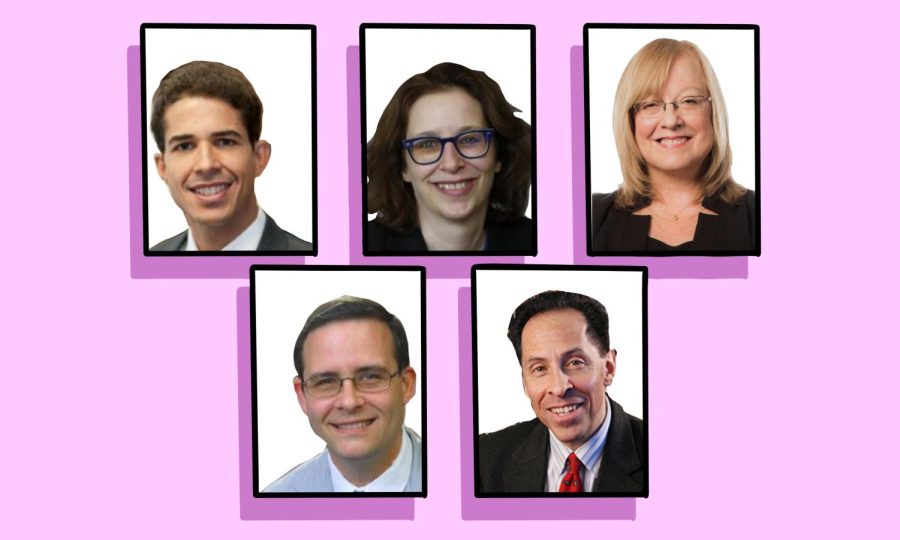‘This story is not going to go away’: Panelists discuss the implications of Dobbs v. Jackson decision
Speakers in the online panel hosted by Pritzker School of Law, Feinberg School of Medicine and Medill School of Journalism, Media, Integrated Marketing Communications to discuss the implications of Dobbs v. Jackson.
July 13, 2022
Pritzker School of Law, Feinberg School of Medicine and Medill School of Journalism, Media, Integrated Marketing Communications hosted an online panel to discuss the potential implications of the Dobbs v. Jackson Women’s Health Organization decision on Tuesday.
Panelists included Pritzker Profs. Paul Gowder, Heidi Kitrosser, Andrew Koppelman, Medill and Pritzker Prof. Doreen Weisenhaus and Feinberg Dr. Cassing Hammond. Pritzker Dean Hari Osofsky moderated the event. The group drew on their personal and professional experiences to discuss the landmark decision.
“Many people in this country, including me, have not experienced this country without the protections of Roe v. Wade,” Osofsky said. “I grew up with its protections and also with harrowing stories about the experiences of pregnant women before those protections existed, and the deep inequalities that resulted from our patchwork of laws.”
Passed in 1973, Roe v. Wade was a landmark Supreme Court Case that ensured the right to an abortion. Dobbs v. Jackson Women’s Health Organization radically changed the face of abortion access in the U.S., overturning Roe v. Wade and permitting states to ban abortion.
Kitrosser said the methodology that the Supreme Court used in Dobbs v. Jackson Women’s Health Organization was the idea that a right is only fundamental and deserving of special judicial protection if it is “deeply rooted in our history and traditions.”
“One debate that has come up in the wake of Dobbs is ‘What does this bode for other rights?’” Kitrosser said. “The court’s methodology arguably won’t accommodate those other rights.”
In his concurring opinion, Justice Clarence Thomas wrote that the cases of Griswold v. Connecticut, Lawrence v. Texas and Obergefell v. Hodges should be reconsidered due to their basis in the due process clause.
Kitrosser added that the Supreme Court does not necessarily always use this methodology. The Court has fluctuated between asking if the issue is deeply rooted in history and taking a looser approach based on the makeup of the court.
Gowder said it was unconscionable for the court to not discuss the relationship between forced birth and enslavement during the hearing. He said the right to an abortion is historically rooted in the 14th Amendment, which recognized the legal status of freed individuals. Forced birth was a key element in the economics of slavery, Gowder said.
“Footnote 41 of the Dobbs opinion mentioned the well recognized fact that disproportionately Black women have chosen to terminate pregnancies in recent years,” Gowder said. “But it also fails to recognize that there are reasons why Black women disproportionately have chosen abortion and how those reasons are rooted in our overarching system of white supremacy.”
Weisenhaus said a few journalists she has spoken to have had trouble separating the personal impact the decision has on them from their reporting because of how much of an effect the ruling has on individuals in their life.
“What happens in America has an impact elsewhere in the world,” Weisenhaus said. “Abortion is not just a U.S. issue. It is in play around the world. This story is not going to go away.”
Physicians’ fear of criminal prosecution has already endangered not only individuals seeking abortions, Koppelman said, but also those who want to have children but face complications. He said this fear is leading obstetricians in Texas to delay intervening until a pregnant individual’s condition deteriorates to the point where they can prove that their life is in danger.
Since 2014, the amount of out-of-state individuals seeking abortions in Illinois has been increasing, according to the Illinois Department of Public Health. In 2020 alone, 9,686 of abortions performed in Illinois were for individuals who did not live in the state.
Many states around Illinois have limited or banned abortion access following the Dobbs decision, including Wisconsin, Kentucky and Missouri.
Hammond said that out of the around 40,000 abortions in Illinois each year, around 20,000 occur within a 20 mile radius of Northwestern Memorial Hospital in downtown Chicago. He said that they expect that number to double as a result of the Dobbs decision and are unsure if they are prepared for the influx.
“Restricting a procedure that is this common is going to impact nearly everybody who provides health care to people who can become pregnant,” Hammond said.
Email: [email protected]
Twitter: @selenakuznikov
Related Stories:
— Thousands march in downtown Chicago to protest overturning of Roe v. Wade
— What Illinois reproductive rights would look like in a world without Roe v. Wade












